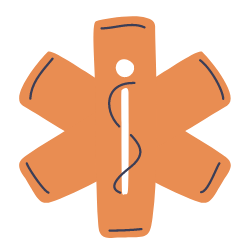For Patients & Advocates
“We’re still in the background struggling to live, day to day, and we need more attention.”
A common frustration among patients suffering with Long COVID is the lack of clarity around the official diagnosis and resulting difficulties to obtain the necessary referrals for the various symptoms they are experiencing. Many Long COVID patients are losing their jobs after years of dedicated service to their communities due to their inability to function at their pre-COVID capacities. The lack of patient support, particularly for those in low income communities with limited access to healthcare, can lead to debilitating and even fatal repercussions.
“We get lost in the shuffle of society.”
Patients and their supporters can use the resources on this page to learn more about advocacy and support groups, healthcare equity, the latest in treatment recommendations and information on how to navigate the obstacles that Long COVID presents.
Resources for Patients & Advocates
Clinical Resources for Long COVID
We are often contacted by Long COVID patients seeking medical care or inquiring about clinical studies. While we are not a clinical research program, one of our aims is to connect those impacted by Long COVID with the most appropriate resources and support systems. There are a growing number of organizations and clinical studies being established to assist long haulers and those who support them. While this list is not exhaustive, we strive to continue to update the community on resources as they become available.
Queer, trans and sick with Long COVID
LGBTQ+ long-haulers face medical bias, financial hardship, and a lack of resources
Guest post by Fiona Lowenstein
It’s not a great time to be an LGBTQ+ person seeking healthcare in the United States, given recent political efforts to criminalize some types of trans-affirming healthcare – but there are additional barriers for those with complex and often misunderstood chronic illnesses. LGBTQ+ COVID-19 “long-haulers” (a patient-coined term for people who developed long-term symptoms following a COVID-19 infection) sit at the intersection of these challenges.
Long COVID + workers’ compensation
Workers’ compensation provides medical and monetary benefits for a percentage of lost wages to employees who become sick or injured on the job. The details and regulations vary widely between states; however, workers must typically prove their injury or illness occurred during the course of their employment. For certain illnesses, including COVID-19, this can be particularly challenging.
What is “medium COVID”?
A new term – medium COVID – has emerged that may add further nuance to Long COVID diagnoses. As the pandemic has progressed, scientists have realized that Long COVID, which was developed in the early stages of the pandemic to broadly encompass the experience of lingering COVID symptoms past the point of what could be considered the acute infection, may be a more complicated diagnosis than originally expected.
Rare manifestations of Long COVID
Common manifestations of Long COVID include headaches, fatigue, or cognitive dysfunction, otherwise known as “brain fog.” But many clinicians are unaware of some of the more rare signs and symptoms. This post focuses on three particularly challenging issues: parosmia (a distorted sense of smell that often causes food and drink to smell distorted), MISC-C (inflammation of various body parts in children) also known as PIMS-TS, and visual delirium (hallucinations).
Long COVID + Children
Although children often have less severe COVID-19 infections and Long COVID appears to be less common in children, Long COVID can affect any person infected with COVID-19, regardless of age. Long COVID research studying the impact in children and adolescents is still limited. We previously posted an article summarizing research about Long COVID among children. This article provides an update of recent literature on the topic.
[UPDATED] Vaccination + Long COVID
New research out of the UK suggests that “COVID-19 vaccination is associated with reduced risk of Long COVID.”
Is Long COVID disproportionately impacting women?
Months after the first onset of Lauren Nichols’ COVID-19 symptoms in March of 2020, she still had a laundry list of maladies that seemed to grow by the day: constant migraines, histamine rashes, reproductive issues, fevers, vertigo, and gastrointestinal problems so severe that some days she couldn’t even keep water down. Her neurological issues were so intense that one day, she says she was trapped inside of her shower because she couldn’t remember what the door handle was. Other days, she forgot what her hands were.
Patient advocacy groups + Long COVID
Advocacy and support groups are important resources for patients, particularly those navigating chronic or rare conditions. Patient support groups bring together people with similar experiences, such as a common medical condition, to bridge their medical and emotional needs through sharing personal experiences, coping strategies, information about the disease and treatment, and resources. Participation in online patient support groups has been shown to lead to patient empowerment, including being better informed through exchanging information and finding recognition.
Long COVID + sleep disturbances
Lack of quality sleep, regardless of Long COVID status, takes a toll on the mind and body. Not only can it lead to daytime tiredness, but sleep loss impairs alertness, cognition, and motivation to participate in day-to-day activities. Racking up quality sleep has been a problem for many Long COVID patients. Other Long COVID symptoms – such as depression and anxiety – are associated with sleep disturbances on their own, potentially causing or compounding these sleep troubles.
Additional
Resources
Volunteer for RECOVER’s COVID-19 studies
Survivor Corps Homepage and Survivor Corps List of Post-COVID Care Centers
Body Politic COVID-19 Support Group
How ACL’s Disability and Aging Networks Can Help People with Long COVID
COVID-19 Insurance Denial Handbook
A Resource to Support Children, Students, Educators, Schools, Service Providers, and Families
For inquiries related to the Long COVID Initiative, please contact [email protected]



